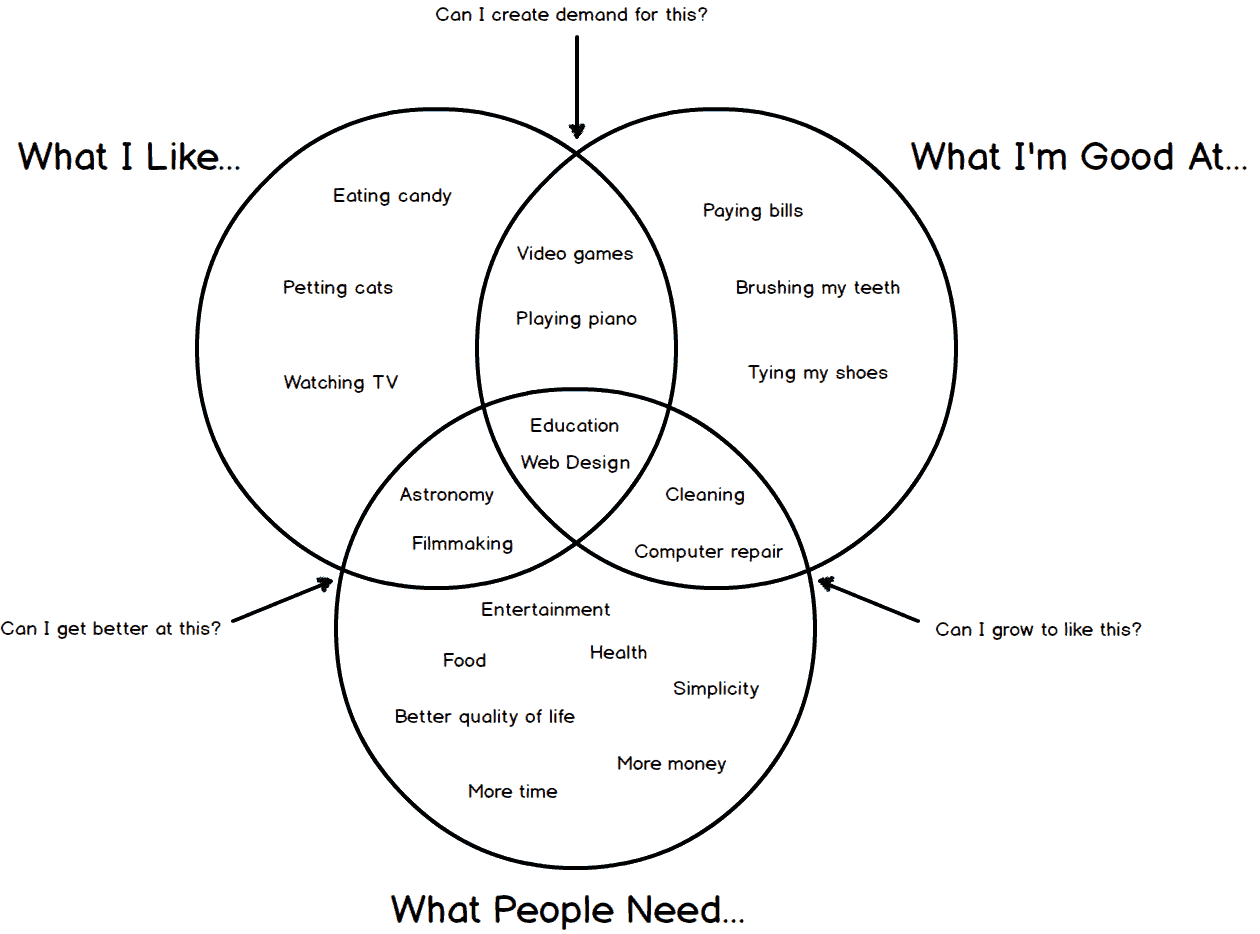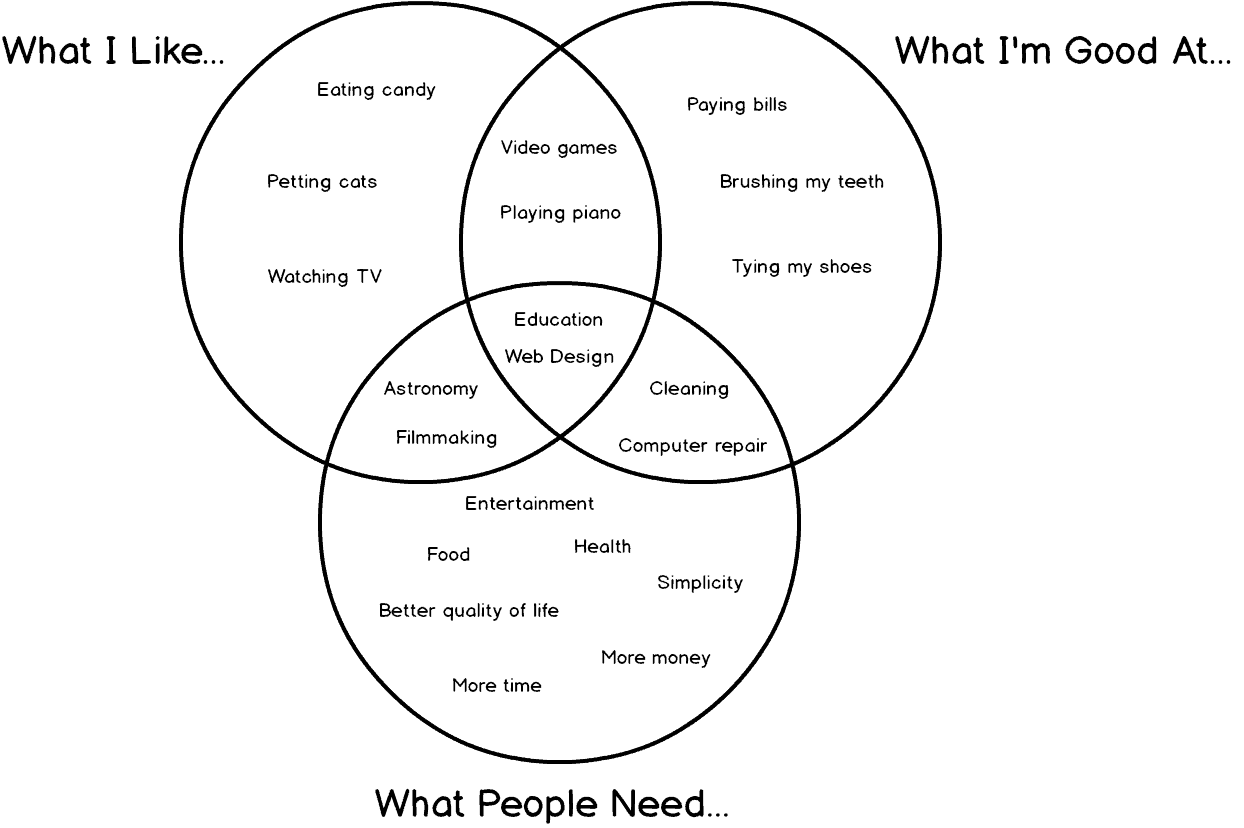A big part of our mission at Treehouse is to help our members start new careers in the tech industry. Our curriculum focuses on job-ready skills that are applicable to the real-world, and if members are interested, we’ll help them get a job.
Even with help, only you can decide what’s best for your future. While you should definitely give it some serious thought, it doesn’t have to be a complicated process. By asking 3 fundamental questions and finding their intersection, you can discover which of your interests and skills has the most potential for success. In each step, I will use myself as an example.
Contents [show]
Step 1: What do I like? (Likes)
When considering career choices, nothing is more important than your happiness. Doing a job just for the money almost never turns out well. In fact, it stands to reason that if you’re not passionate about what you do, you probably won’t put in the extra mile that’s needed to earn promotions, lead the industry, and make a dent in the universe. If you love what you do, the money will come or it won’t matter to you. Either way, you’ll still be happy.
The best way to get started is to make a list of all the things you like. Here’s a list of some things that I like, in no particular order:
- Web design
- Video games
- Educating others
- Playing piano
- Astronomy
- Filmmaking
- Petting cats
- Watching TV shows
- Eating candy
Keep listing things until you can’t think of anything else. Once you’ve made this initial list of likes, you’re ready to move forward.
Step 2: What am I good at? (Skills)
Sometimes it’s easy to fall into the trap of feeling talentless, but the truth is, everyone is good at something. The next step is to make a list of all the things you’re good at; even mundane things like “setting the table” or “telling jokes.” While there are probably some career choices where things like “procrastinating” or “lying” might be helpful, it’s best to keep this list somewhat morally positive. Here are some things I feel like I’m good at, in no particular order:
- Web design
- Video games
- Educating others
- Paying bills
- Playing piano
- Brushing my teeth
- Tying my shoes
- Cleaning my apartment
- Computer repair
Again, keep listing things until you can’t think of anything else; it’s really important that you get it all out. More than likely, you’ll have a few things you like that you also feel like you’re good at. We’ll come back to this idea.
Step 3: What do people need? (Demand)
In other words, what are people willing to pay for? This is probably the most difficult question to answer. It depends on where you live in the world, how the economy is behaving, and a huge number of other external factors. That said, there are probably some things that people will always need no matter what. Here’s the list I came up with:
- Food
- Health
- Education
- Simplicity
- Better quality of life
- More time
- More money
- Entertainment
Next, go back to your previous lists of Likes and Skills, and then decide if they belong on this list of Demand. Here’s what I added from my other lists:
- Cleaning
- Computer repair
- Educating others
- Web design
- Astronomy
- Filmmaking
Finding the Intersections
Now you can find the intersection of all three categories. Whatever is on all three lists is probably the thing that you should seriously consider pursuing; you like it, you’re good at it, and people need it. Here’s what my chart looks like:
In my chart, education and web design are the two things that fell in the middle. The great thing about working at Treehouse is that I get to combine them both together! I even get to include a few other likes, such as filmmaking, because I work in our awesome video studio in Orlando.
Your chart might not come together quite as neatly as this example, but that’s OK. If you don’t have anything in the middle, here are some ancillary questions you can ask about the other intersecting categories:

This chart adds ancillary questions about Likes, Skills, and Demand. Can I create demand for Likes and Skills? Can I get better at Likes and Demand? Can I make myself something that’s both a Skill and a Demand?
For the sake of being thorough, here are my thoughts on each intersection:
- Likes + Skills – Can I create Demand for this?
- Playing piano – If I became really good at piano and wrote some songs, I might be able to create demand and get people to pay for this. You don’t have to be a global sensation to make a decent wage in the music business.
- Playing video games – Unless you’re one of the top players in the world and you live in South Korea where games are a popular spectator sport, pursing a career in pro gaming is nearly impossible. You’re better off playing the lottery.
- Likes + Demand – Can I develop this into a Skill?
- Astronomy – I like learning about the cosmos, but I would have to get a lot better with advanced math to seriously pursue astronomy. Doing complicated astrophysics calculations and spending long nights in a cold observatory probably doesn’t fit my personality.
- Filmmaking – I like making movies, but it would take a lot of work to pursue it as a career; work that I’m not currently prepared to take on. I lack the dedication to work as a production assistant in Los Angeles for 15 years to maybe get the shot at a directing a big feature.
- Skills + Demand – Can I turn this into a Like?
- Cleaning – I’m pretty good at keeping my apartment clean, and people definitely need cleaning services, but it doesn’t engage my mind.
- Computer repair – I’m good at fixing computers, but only as a means to an end. A computer is the tool I use to design websites, so knowing how to fix it when things go wrong makes web design easier.
It’s hard to create demand for something unless you’re really doing something extraordinary. For example, nobody knew they wanted an iPhone before Apple created them. It’s also hard to change what you like; maybe there’s some aspect of running a computer repair business that I might enjoy, but it sounds like a chore.
On the other hand, I think the most important ancillary category to pay attention to is the intersection of Likes and Demands. If you enjoy something and people need it, you can use those two things as motivators to pick up a new skill. Web design used to be in this “hobby” category for me, but eventually I decided to pursue it more seriously. If you’re passionate about a killer idea for a website or a new phone app that people really need, the skills are easy to pick up with services like Treehouse.
Obviously there are many ways to choose a career path, but I think people have a tendency to overcomplicate it. If you’re changing careers or if you’re just starting out, this is an opportunity for fresh thinking. And of course, it’s never too late to learn something new.
I’m curious, what factors do you consider when deciding on a job? Let me know, in the comments!










Thanks, Nick, for this great article! After graduation I was looking for my first job but I didn’t know what my true passion was. So I took a career coach to help me finding the right job for me. My coach did a fantastic job in preparing me for a professional career as a manager. The mock interviews my coach conducted were extremely helpful in preparing me for the wide array of questions and situations that I found myself in during multiple rounds of interviews. She also took considerable time to review my resume, offering helpful tips and critiques that have since enhanced my resume’s presentation and content. As well, we were staying in constant contact throughout the entire search and she was always available to answer any questions I had. Through her assistance I got the confidence needed to transmit the theory explained in this fabulous article into real action and proof in daily life (for who might be interested: Your24hcoach). Good luck, everyone!
Hmm, demand was something I NEVER though of.Helpful article indeed.But my problem is that I am not well aware of what is actually out there or rather I’m not sure of my options and I really can’t dig many skills that I posses